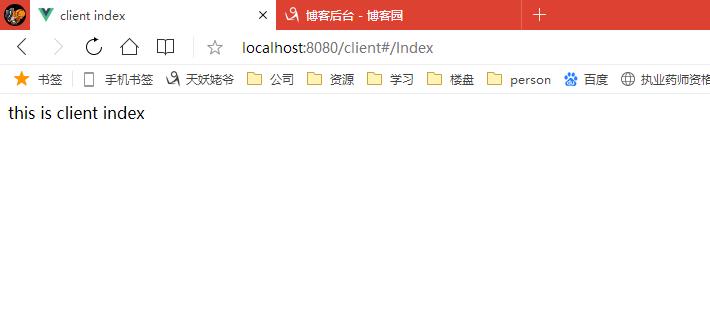vue.js之使用Vue CLI3开发多页面应用-路由理解
Posted 天妖姥爷
tags:
篇首语:本文由小常识网(cha138.com)小编为大家整理,主要介绍了vue.js之使用Vue CLI3开发多页面应用-路由理解相关的知识,希望对你有一定的参考价值。
测试项目有3块路由,如下图

在src目录下的router.js
import Vue from \'vue\'
import VueRouter from \'vue-router\'
Vue.use(VueRouter)
const routes = [
{
path: \'/\', name: \'Login\', component: r => {
require([\'./components/Login\'], r)
}, meta: {title: \'Login\'}
}
,{
path: \'/HelloWorld\', name: \'HelloWorld\', component: r => {
require([\'./components/HelloWorld\'], r)
}, meta: {title: \'HelloWorld\'}
}
]
export default new VueRouter({
routes: routes
})
src下的main.js
import Vue from \'vue\'
import App from \'./App.vue\'
import router from \'./router\'
Vue.config.productionTip = false
Vue.use(require(\'vue-wechat-title\'))
new Vue({
router,
render: h => h(App),
}).$mount(\'#app\')
src下的App.vue
<template>
<div id="app" v-wechat-title="$route.meta.title">
<!-- <HelloWorld msg="Welcome to Your Vue.js App"/>-->
<router-view></router-view>
</div>
</template>
<script src="/js/libs/layer/layer.js"></script>
<script>
// import HelloWorld from \'./components/HelloWorld.vue\'
export default {
name: \'app\',
components: {
// HelloWorld
}
,mounted() {
this.init();
}
,methods:{
init:function(){
layui.use(\'upload\', function(){
var upload = layui.upload;
//执行实例
var uploadInst = upload.render({
elem: \'#test1\' //绑定元素
,url: \'/upload/\' //上传接口
,done: function(res){
//上传完毕回调
}
,error: function(){
//请求异常回调
}
});
});
}
,loginV:function () {
window.location.href="/console.html";
}
}
}
</script>
<style>
#app {
font-family: \'Avenir\', Helvetica, Arial, sans-serif;
-webkit-font-smoothing: antialiased;
-moz-osx-font-smoothing: grayscale;
text-align: center;
color: #2c3e50;
margin-top: 60px;
}
</style>
其他两块跟这个类似,关键代码在vue.config.js
module.exports = {
pages: {
// console: {
// // 应用入口配置,相当于单页面应用的main.js,必需项
// entry: \'src/modules/console/console.js\',
//
// // 应用的模版,相当于单页面应用的public/index.html,可选项,省略时默认与模块名一致
// template: \'public/console.html\',
//
// // 编译后在dist目录的输出文件名,可选项,省略时默认与模块名一致
// filename: \'console.html\',
//
// // 标题,可选项,一般情况不使用,通常是在路由切换时设置title
// // 需要注意的是使用title属性template 中的 title 标签需要是 <title><%= htmlWebpackPlugin.options.title %></title>
// // title: \'console page\',
//
// // 包含的模块,可选项
// chunks: [\'console\']
// },
// 只有entry属性时,直接用字符串表示模块入口
console: \'src/modules/console/console.js\'
,client: \'src/modules/client/client.js\'
,index:"src/main.js"
}
}
如果存在改文件,则访问方式类似 url/client#/Index...,如下图



在页面中,我们的template 里仍然可以用 <router-view></router-view> 标签去获取路由对应的模块
当然vue.config.js 还可以有其他设置,用到了再进行完善吧
以上是关于vue.js之使用Vue CLI3开发多页面应用-路由理解的主要内容,如果未能解决你的问题,请参考以下文章